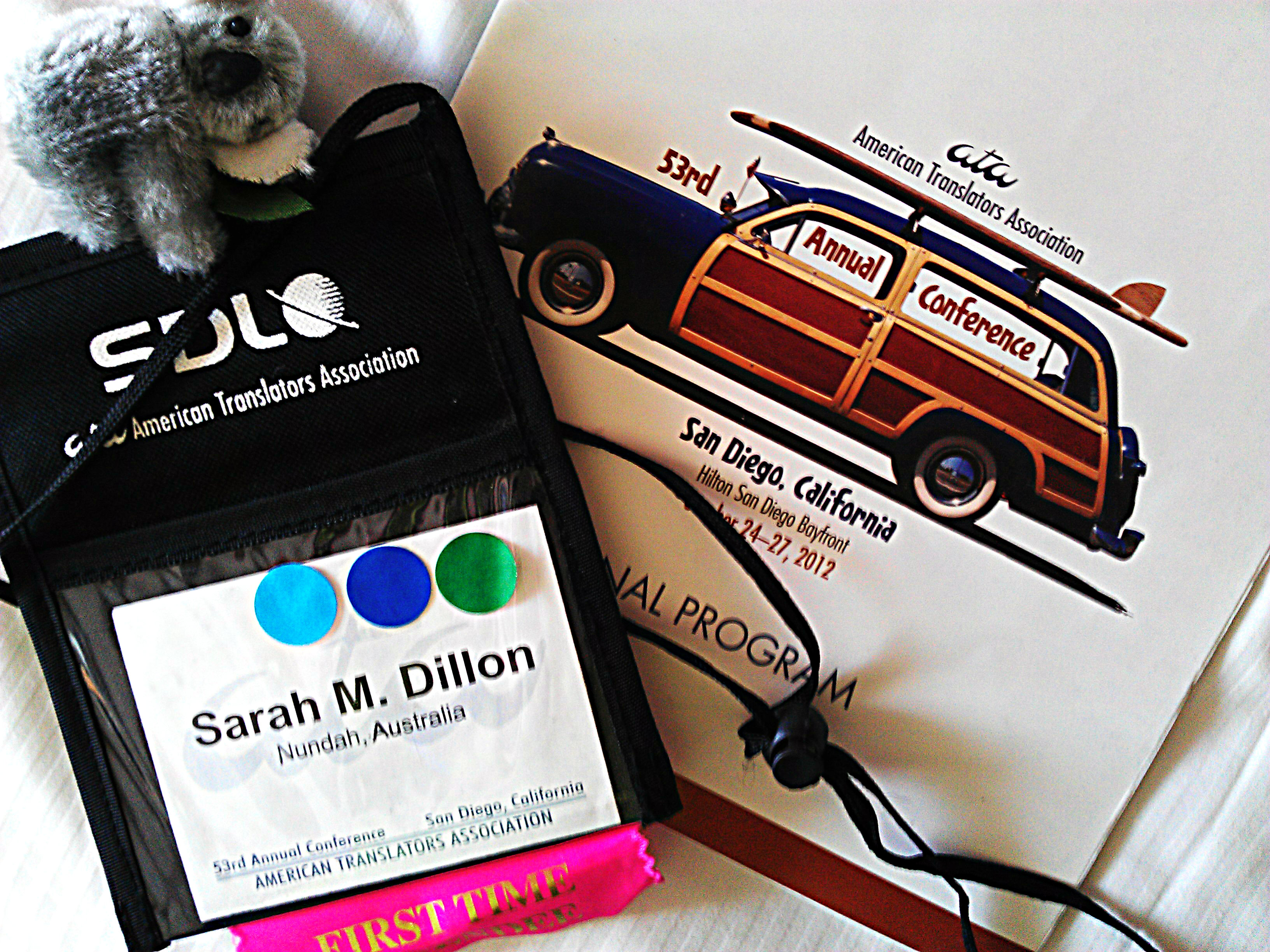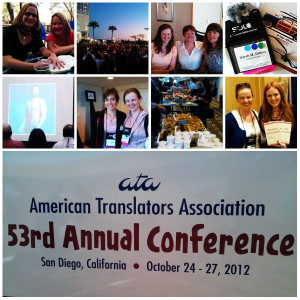Here’s a high-level look at some of my impressions of the 53rd Annual Conference of the American Translators Association (ATA), held in San Diego 24 – 27 October 2012.
53rd ATA Annual Conference: In Pictures
I’m just back from the 53rd Annual Conference of the American Translators Association (ATA), which was held in San Diego 24 – 27 October this year. Here is a little conference round-up in images (written report to follow).
In the meantime, check out the conference Twitter feed and associated quotes, links and photos here.
Hello fellow AUSITeers
Hello to any AUSITeers who may be dropping by after my recent talk at the AUSIT QLD Mini-Conference in Brisbane.
As promised, below is my presentation, Webinars: A T&I Professional’s Best Friend. [Read more…]
Apprenticeships for translators
The topic of apprenticeships, work placements or internships for translators interests me for several reasons, not least because I believe on-the-ground learning alongside more experienced peers is a vital part of education in any field.
But it’s particularly interesting in translation because of the way in which our industry is organised. Most translators work freelance because unless you want to go the civil service route, there are very few inhouse positions for native English translators involving primarily translation work, as opposed to project management, terminology, or other translation-related tasks.
This makes it difficult for newcomers to the profession to find obvious opportunities to learn from their peers.
Yet professional associations and universities can and do already play an important role in plugging that gap, even if the options aren’t as formalised as they are in other industries. When the issue came up at the recent ITI / eCPD Virtual Coffee Morning on International Translation Day 2011, it struck me how unaware many of the participants were of these opportunities. [Read more…]
Taking advice gracefully
It’s easy to look at a piece of advice and come up with a hundred reasons why it won’t work for you. There are as many ways to be a translator as there are translators, after all.
But maybe none of our professional problems are that unique. So if a suggestion doesn’t fit your situation 100%, rather than dismissing it entirely, I think it’s worth thinking about the ways in which it might fit.
For example, Fire Ant & Worker Bee are big advocates of the idea that translations appearing in print should bear the translator’s name as a matter of course, and that it is the responsibility of translators to ensure this happens. In their online column and book, they put up a good argument in support of this idea and offer easy-to-follow advice for translators wishing to pursue this option.
I think it’s a great idea. But given my current portfolio, it would be easy to dismiss it and focus on how it doesn’t suit me. For example, I don’t often work on translations that are destined for print, and as such, my work can be tweaked and updated by any number of people over its lifetime (which isn’t to say the work is any less critical or lucrative, of course).
But I can still see the merits of the suggestion, and there’s no reason why I can’t apply the principles behind it to all my translations. What translator wouldn’t benefit from taking concrete steps to ensure proper accountability, due recognition, rigorous standards and appropriate control of their work? These are lofty ideals and not easy to reach with every job, but that’s not to stay I should stop aspiring to them.
Regardless of our individual circumstances, I think we can all learn something if we keep our minds open and our brains turned on when we hear about the ways in which other translators work.
New adventures
Well, it’s Friday (in Australia, anyway) and here’s my news. [Read more…]
Getting over the hump. Or: long-term career development for translators

One of the best things about being a freelance translator is that it is entirely up to you how your career develops. I’ve always found that very empowering. But of course, one of the worst things about being a freelance translator is that it is entirely up to you how your career develops. It’s not always easy to handle that degree of choice.
Jed Schmidt, the original globe-trotting translator, says that translators have three options when it comes to developing long-term careers in translation. They can go deep, and immerse themselves so thoroughly in a particular area they become the go-to translator for that niche. They can go wide, and expand into providing other translation-related services. Or they can go fish: leave translation itself behind but move into a job that is still part of the wider translation industry. [Read more…]
Interview with Lucy Brooks, German, French and Spanish translator
Lucy Brooks is a German, French and Spanish to English translator with 20 years’ translation experience.
She was one of the first translators to attain the prestigious Chartered Linguist (Translator) status in the UK, and recently started a company called eCPD Webinars to facilitate online training for translators and other linguists.
If you’ve been following me on Twitter, you’ll know that I’m a big fan. I’ve attended several of their webinars* over the past couple of months, including ones on specialising in pharmaceutical translation and specialising in medical translation.
So last week I spoke to Lucy about her career as a translator, the importance of continuous professional development (CPD) and how she came to start her new company. We even conducted the interview in webinar format so you can see for yourself how it works. Have a look (and a listen) and let me know what you think: [Read more…]
CPD Matters: Maintaining source-language skills
This post focusses on language development and maintenance (source languages). Language exchanges, newspapers, podcasts and Tweeting: that’s the last you’ll see of these options here. What other ways are there for professional translators to keep their source languages shiny and bright? The third in an occasional series on CPD.
CPD Matters: Refining translation skills
Today I’m looking at maintaining and improving your translation skills. Ongoing development of your existing translation skills is quite distinct from initial translator training, and needs to be approached differently too.

The second in an occasional series on CPD. First one: What is CPD?
- 1
- 2
- 3
- …
- 6
- Next Page »

